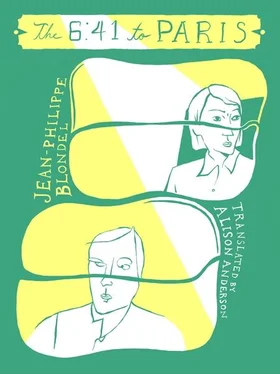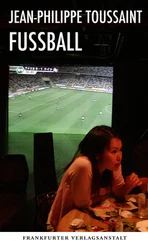Because Mathieu is at death’s door, and he trusts me. And it feels good.
It’s repugnant.
I could tell her, Cécile, about Mathieu. But she probably doesn’t remember him. They crossed paths only because of me. When I was going out with her, I saw a lot less of him. She must have met him two or three times at most, at parties, where they hardly spoke. He thought she wasn’t much to look at. He couldn’t understand why I was wasting my time with her. When I came back from London, I simply told him that it was over, he nodded, and we never spoke of it again.
I can’t believe it.
We can’t go our separate ways like this, with me getting to my feet, and her sitting there, and me saying, “Have a nice time in Paris!” and getting off the train. It’s idiotic, I have to do something, it’s my only chance. If only I had a business card. I’ve always been impressed by business cards. These people you hardly know, and after only a few minutes talking to them they hand you a card with their name and address, you don’t really know why, what do they expect, for you to call them? For you to go and have a drink together, and become friends or even more if you get along? And yet the fact remains I wish I had one now.
These days our kids have it easier. Manon and Loïc just tell someone that they’re on Facebook or Twitter, and the other person nods, and that very evening they’re virtual friends, and they know all about each other’s lives, their likes and interests, their professional situation. I’m not on Facebook. At one point I wanted to sign up — my kids couldn’t believe their ears. I toyed with the idea for a while and then on reflection I wondered who I would contact on a social network. Mathieu’s friends? Forgotten classmates? Colleagues I see every day anyway? It seemed pointless. I abandoned the idea. But now Paris is getting closer, and on our right you can just see the outline of Sacré-Coeur between two tall buildings, and I’m beginning to feel real panic.
I can’t go on letting things slip away from me. I can see the years ahead — like railroad tracks stretching into the distance, as far as the station. I meet people, and then they’re gone. And all that’s left is the debris they leave behind — remnants of shared lunches, hastily drunk coffees, snatches of conversation, murmurs.
It hurts.
There, in my chest.
Between my ribs.
I’m not scared. I’m used to it. It’s been waking me up at night for the last few months. I mentioned it to the doctor, he shrugged, he asked me if there was anything bothering me. It’s nerves, he added. Nothing out of the ordinary.
I’m nervous.
And nothing out of the ordinary.
That night was probably even more unexceptional than the others. Pathetic. Kathleen didn’t ask a single question after Cécile left. She just wanted to lie down and go to sleep. You could hear the birds in the little park across from the hotel. She got undressed very quickly and lay down on her back. She didn’t seem to care one way or the other about what was about to happen. It was depressing. As for me, I tried to revive a bit, but it didn’t go very far. By tacit agreement we didn’t take the experiment any further. She fell asleep almost at once. I didn’t. I lay staring at the ceiling — it had recently been repainted, it looked like a rush job. The day that had just gone by flickered past my eyes, but I couldn’t make any sense of it. I just wondered how I had come to this.
Apparently there are people who, at a certain time in their life, get the impression they’re touching bottom and then mentally, they kick the floor with their heel to go back up. I’ve never believed in that sort of nonsense. Because it’s never happened to me. I didn’t get the feeling I was headed back toward the light, either the next morning, or in the days that followed. I woke up at noon, and Kathleen had left, the room was paid for two more nights, so I hung around London. I wrote two or three letters, to Cécile, to Mathieu, but I didn’t send them, I forgot them at the hotel. I must have done that deliberately.
I went back to France.
Life went on.
The defiance only came gradually. I knew I was capable of shabby betrayals, of low-down tricks. Whenever I started going out with a girl who was willing and eager, I tried to make her understand that I wasn’t worth it. And when we broke up, I would point out that I had warned her. But that never prevented the crying, the tears, the insults — on the contrary, the more they knew I was right, the more they hauled me over the coals.
And then at one point I just gave up.
I was twenty-seven, I was a TV and VCR salesman at a superstore, I was living in a cheap and reasonably comfortable two-room apartment; one evening, I sat by the window in the kitchen and I said to myself, Okay, I think I’ve had enough. I didn’t feel like meeting anyone — all the hoops you had to jump through, pretending to admire or understand — I would rather just fade into the background and let the world go about its business — it would be easier that way. I was tired. That’s it. Yes. Exhausted, even. I met my wife six months later. That’s what she liked about me, right from the start, my fatigue. My disillusionment. And consequently, my candor. She took up the challenge. My wife is something of a Pygmalion. She wanted to restore my fighting spirit.
And eventually she gave up.
I understand her oh so well.
But along the way, we did have two children together. That counts for something. That’s what I keep telling myself, every day. It’s not nothing. I still count for something.
Ouch.
It’s almost as if someone were snipping at my lungs with very fine scissors.
I have to stretch — as a rule, that eases the pain.
Like that, yesss.
Uh-oh. I bumped into Cécile Duffaut.
“Excuse me, I’m sorry.”
“No problem.”
Silence.
Loudspeaker crackling.
Our train will be arriving shortly in Paris, Gare de l’Est, our final station. On behalf of the SNCF, the train manager, and crew hope you have had a pleasant journey.
“I am really sorry.”
“It’s not a problem, really, it was nothing.”
“No, that’s not what I mean. What I mean is, I’m sorry about everything. About what happened almost thirty years ago. About London. I am. I’m really sorry.”
“Oh. Thank you.”
At least now it’s done.
I expect it’s something Mathieu would have done, too. That’s how he must be feeling these days, wishing he could ease his conscience. Put an end to all the failures, tie up all the loose ends. When you’re at death’s door, you won’t be in the mood for Impressionists. Vermeer would be more like it. A View of Delft , say. Or any seventeenth century Dutch interior. Or why not Bacon’s screaming popes or decomposing bodies, while you’re at it.
I don’t know how he’s doing.
Yesterday on the phone he was totally delirious. Half in tears over a red bicycle he used to have when he was nine years old, and half elated because he’s convinced that he’ll be going home soon. I’m glad his mother is not altogether lucid anymore. I couldn’t stand seeing any of my children die before me.
I got hold of the head nurse on the phone. She knows me. She knows I’m a substitute family. I’m everything at once: parents, brother, son, friend. Even though Mathieu and I stopped seeing each other for almost twenty years. It’s pathetic. She told me they’d increased the dose of morphine, and that his delirium might be a consequence of the injections, unless the metastasis has already reached his brain. They would have to check, with a scan. There was a moment of silence. She murmured, “If it comes to that.” I understood that I had to get there as fast as I could.
Читать дальше












